Peter MALONE
Love, Weddings and Other Disasters
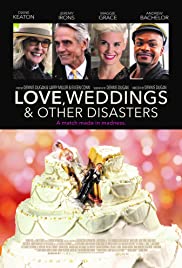
LOVE, WEDDINGS AND OTHER DISASTERS
US, 2020, 96 minutes, Colour.
Diane Keaton, Jeremy Irons, Maggie Grace, Diego Boneta, Andrew Bachelor, Dennis Dugan, Jesse Mc Cartney, Veronica Ferres, Elle King, Andy Goldenberg.
Directed by Dennis Dugan.
Unless the screenplay is the story of the Titanic or something similar, filmmakers should be wary about including the word disaster in the film title. Critics will be sure to take it up and use it against the film. Which they have with this one. There are quite a lot of disasters, slapstick, pratfalls, literal knockabout, and a spectacular opening of skydiving and the divers landing in the middle of an outdoor wedding, with the leading lady, Jessie, the skydiver who dropped her nervous boyfriend, television anchor, from the sky into a pool, earning the nickname The Wedding Crasher, instantly on social media. Perhaps The Wedding Crasher could have been the title for this film.
Whether you enjoy the film will very much depend on your sense of humour. Best to have a very broad, undemanding sense of humour. The screenplay sounds like Dennis Dugan (director of a number of Adam Sandler comedies and appearing in them), director, writer, co-producer, appearing as a reality show television compere, invited his colleagues to a meeting where they put forth a whole range of possible situations and some corny dialogue – and then he decided that that would be enough, that all will be included, a whole conglomeration, so to speak. And, it plays at that level.
Dugan himself to scenes, sending up comperes wine glass, in hand, of trashy reality shows – this one called Couple Crash with bizarre couples (Rabbi and Muslim, dwarf and tall woman…) Chained together, audience voting as to who was the most successful – prizemoney $1 million!
Jessie is the central character of the film, beginning a career in wedding planning. She is played by Maggie Grace, the most attractive character in the film. She encounters a rather supercilious planner, Lawrence, played by Jeremy irons, a widower, promised a blind date (turns out to be literal, Diane Keaton playing vision impaired, a bit like Annie Hall in her 70s). Jessie also is attracted to a band player, Mack (Diego Bonita) who is being stood up by his close friend, breaking up the band. Thankfully, throughout the film, there is a street singer playing her guitar, ready to take up the challenge of the wedding reception.
And then, there is Captain Richie (Andrew Bachelor playing as if he were auditioning, successfully, to be one of the Wayan brothers), with his boat-bus, tours of Boston, attracted to a young woman with a slipper tattoo on her neck, his desperate going on a Cinderella quest!
One question arises: what are Diane Keaton and Jeremy Irons doing in this kind of film (something which they might have been asking of themselves).
So, a piece of semi-raucous American froth, which might be described as an undemanding comedy.
1. The title? The ingredients? The range of disasters? Pratfalls, slapstick, situations? Literal knockabout?
2. American comedy? Dialogue, situations, parody?
3. The theme of love, Jessie and the opening and the skydiving? Jesse and Mack? Captain Richie and the Cinderella theme? Lawrence and Sara? Robert and the preparation for the marriage, his wife and enthusiasm? The preparations for the wedding, the problems, everybody arriving, the chamber music, the band, everybody celebrating?
4. Disasters, the skydiving, the crash and disruption of the wedding, Sara, vision impaired, the crashing of the centrepiece, with Lawrence, rearranging her room, her fall…? The band, the breakup? The television show, the range of couples, their disasters? The Mafia interventions? The almost disaster of the wedding and the reception?
5. The situations, familiar, conventional, the level of dialogue and wit?
6. The television show, Dennis Dugan as the compere, with the wine glass, the couples, the audience, chained together? The Rabbi and the Muslim, the tall woman and the dwarf, the black woman and the cross-dressing man (care of the Mafia)?
7. Robert, standing for mayor, his fiancee, the discussions about the wedding, the severity of his political adviser? Discussions with Jessie? With Lawrence? The situation with his brother, the photo opportunity, his going on the television competition, being followed continually by the camera crew who were “not there�? The relationship with Svetlana, finding out the truth about her, exotic dancer, the club, the Mafia man in the night, the Mafia connections? The threat to kill? Interested in the million-dollar prize? Their interventions?
8. Captain Richie, the boat, extrovert, the clients, the spiel, attracted to the young woman, the title of the slipper, his searching for her, the women with the tattoos arriving, the boat and helping Robert and crew to get to the wedding? His going to the reception, seeing the waitress?
9. The singer in the street, the lyrics of her songs, the other guitarist? The invitation to come to the wedding, all the others connecting? Playing, Celebration?
10. The band, Lennie and the girlfriend, the breakup, the attraction to Jessie? Happy at the wedding?
11. Lawrence, Jeremy Irons’ style, the supercilious Englishman, the wedding preparations, meticulous with layout, with the staff? His friends and the blind date, Sara arriving, literally vision impaired, crashing the centrepiece? The promise of the phone call, his not ringing, her arriving, the bond between them, the picnic lunch, the night together, his rearranging the furniture and her fall, her coming to attack him, his apologising, the blindfold, the tour through the city blindfold? And a happy ending?
12. The severity of the film critics on this film?
Honorable Men
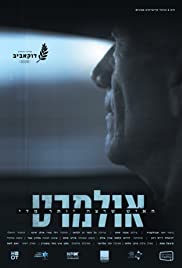
HONOURABLE MEN
Israel, 2020, 120 minutes, Colour.
Directed by Roni Aboulafia.
This is a two-part documentary made especially for an Israeli audience. It is of interest to audiences outside Israel but this will depend on audience knowledge of Prime Minister Ehud Omert, his time in office, his resignation, tried for bribery and fraud. For those not familiar, there is quite an amount of background explanation.
The first half of the film focuses on Omert as Prime Minister, giving his family background, poverty in Israel, the principles of the family, his education, political ambitions, his serving in the Knesset, his 10 years with two terms as mayor of Jerusalem. The film shows his political stances, his attitude towards Palestinians, towards the settlements on the West Bank, International negotiations.
The second part of the film is called The Defendant, indicating animosity towards him and his political views, especially from right-wing groups, and the keeping of extensive files about his activities, files that could be used against him when needed. And, with his diminishing in popularity, especially 2006 after the attack on Lebanon on, there were moves to bring him down.
The framework of the film is the judgement condemning to prison, his being seen transported to prison, a recurring image of the outside of the prison, its wall and barbed wire atop, and a recorded interview with him from prison.
The film also introduces characters for the prosecution, a very self-assured prosecutor, and members of the defence team. Each gives their point of view on their preparations and the conduct of the case.
A lot of detail is given, much of it quite intricate, accusations of exploiting travel arrangements and using surplus funds for family travel, negotiations for an extensive loan for his brother, various dealings with business interests. Ultimately, a lot of the charges were dismissed. However, some of them continued, with a renewed interest in Omert’s secretary of 25 years, Sula Zeken. She appears speaking in her defence during the film. Omert turns against her, accusing her of the crimes and a relationship with one of the businessmen. She turns witness against Omert as well as pleading guilty.
The film ends with the release of Omert from prison, his status in Israel as former prime minister. He was succeeded by Benjamin Netanyahu – and continues critical of him.
Arkansas
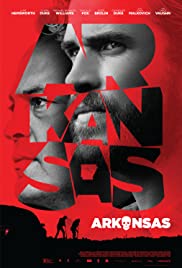
ARKANSAS
US, 2020, 117 minutes, Colour.
Vince Vaughn, Liam Hemsworth, Clark Duke, John Malkovich, Vivica A. Fox, Barry Primus, Chandler Duke, Michael Kenneth Williams, Eden Brolin.
Directed by Clark Duke.
The original title of this film is Arkansas, a focus on the state, action taking place there and extending into neighbouring states like Louisiana and Oklahoma. However, for some international release, it received the title The Crime Boss.
The film was written and directed by actor, Clark Duke, who also appears in the central role of Swing, a would-be criminal, drug dealer, dependent on his friendship with a more authoritative partner, Kyle (Liam Hemsworth). Swing has a way with words and expressions which makes his character quite distinctive.
The film is told in explicit chapters, sometimes focusing on the partners, at other times focusing on a mysterious character, called Frog, a master drug-dealer. He is played, with sinister overtones often-smiling face, by Vince Vaughn.
The film does move backwards and forwards in time, especially when it gives the background story for Frog and his emerging into the big time of drug dealing in the area and his control of various dealers.
A surprise in the first part of the film is the appearance by John Malkovich as a local trooper but revealed as heavily involved in the drug business, busting the two young men, then employing them, linking them with Frog whom they have never met, but the trooper then falling foul of thug killers.
There are a number of character actors in supporting roles as drug dealers, Michael Kenneth Williams, Barry Primus, Vivika A Fox.
It all builds up to confrontation, vicious fights, deaths.
Familiar material in its way, but a range of interesting performances, complex plot lines…
1. The title? An alternate title, the Crime Boss?
2. The locations in the American south, Arkansas, Louisiana, towns, mansions, communities, bars, drug warehouses…? The musical score?
3. The screenplay divided into chapters, the different focuses on characters, interconnections? The work of Clark Duke as writer, Dir, actor?
4. The introduction to Kyle, loner, self-assured, dealing drugs, encounter with Swing, the partnership, their working together, receiving orders, from Frog whom they never see, from Her whom they meet? Moving the drugs, the encounter with ranger Bright, smart, his turning the tables, taking them in, employing them, their work, their assignments?
5. Bright, a turn by John Malkovich, authority, his centre, drugs, his manner? The thug’s coming, the confrontation, the torture, his death, Kyle and Swing finding the body, burying it, telling the false story?
6. The introduction to Frog, his shop, old stuff, Kyle and Swing visiting? Their not knowing who he was?
7. The flashback, frogs career, as a Wheeler dealer, sales, the encounter with Armond, their discussions, checked out, Armond employing Frog, a weeks test, success, his wanting to do more, Armond’s caution? The buildup of the empire? His betrayal, phoning the police, Armond’s arrest and imprisonment? Frogs takeover and prosperity, the range of underlings, the encounter with the young twins and their work, employing them, keeping them with him over the years, their loyalty?
8. Kyle and swing, the continued activities, the visit to Her and her personality and domination?
9. Frog, settling locally, is using of Kyle and Swing, the greater realisation of who he was?
10. The buildup to confrontations, the twins, the attack on Kyle and Swing, Swing’s death, the violence of the twins, Kyle and his injuries, the comeuppance, and a violent ending?
11. And cycles beginning again?
Cielo Stellato Sopra is Ghetto de Roma, Un
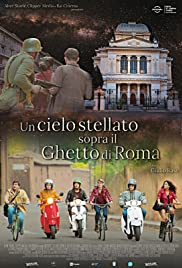
UN CIELO STELLATO SOPRA IL GHETTO DI ROMA/ A STARRY SKY ABOVE THE ROMAN GHETTO
Italy, 2020, 100 minutes, Colour.
Bianca Panconi, Aurora Cancian, Daniele Rampello, Lucia Zotti, Giulio Base.
Directed by Giulio Base.
A drama set in Rome in the modern day. However, it is also story about Jews during the German occupation in Rome in the 1940s, the rounding up of Jews, their persecution, internment – as well as showing sequences where sympathetic clergy and, especially, with nuns and their convents, talking in many of the refugees, especially the children.
The 1940s story concerns a little girl, Sarah Cohen, whose parents are taken away and one of the younger sisters, Sister Lucia, hides her. After the war Sarah is adopted but the documentation lost. The film also has a background story of Sister Lucia, a young girl, falling in love, her becoming pregnant, condemnation by her parents, and her child taken away and adopted.
In the present, with a focus on young music student and her friend at school, Sofia, she finds a hidden letter in a suitcase in the attic and decides to pursue the origins of the letter, addressed to Sarah Cohen. This involves insensitively going to the great synagogue of Rome on the Sabbath, turned away by young men, later encountering them as students, bonding with them, going to a Jewish scholar, searching out documents, going to visit Sister Lucia, a very elderly nun by this, hearing the story, and Sofia discovering that the adoptive parents of Sarah had the name of her grandfather. Her grandmother, a very lively character lives at home, her father musician travelling abroad and performing, her rather haughty mother in the house.
All the students, Jewish and non-Jewish, decide to put on a play re-enacting the events, are reposed by the school as well as the Jewish parents. Ultimately, there is discovery, the grandmother finding her identity, moved by the play, and some kind of dialogue between the Jewish and non-Jewish people of Rome.
The film is directed by Giulio Base, director of many films, here appearing as Sofia’s father.
1. The title? The focus on the Roman Jewish community? The ghetto? The great synagogue? The story from the World War II Jewish past? A contemporary Jewish story? A story for dialogue between Jews and non-Jews?
2. The Roman setting, the vistas of the city, homes and apartments, schools, convents, rehearsal space and performance? The musical score?
3. Audience response to the 1940s story, Jews in Rome, the German occupation, the persecution of the Jews, escapes, imprisonments, children and their being sheltered by the Catholic Church, clergy, convents? The story of Sarah Cohen? The roundup, invasion of the convents, Sarah being hidden by Sister Lucia, surviving? Her post-war adoption? The portrait of the nuns, their action, superior and her treatment by the military?
4. The contemporary story, the focus on Sofia, her friend, music, studies and the sequences at the music school? The suitcase in the attic, finding the letter? The story of the case bought secondhand? The letter to Sarah Cohen? The challenge for Sofia, wanting to find out the story behind the letter?
5. Sofia and her family, her genial grandmother at home, her father the musician, on tour, performance, the phone calls? Her mother and her haughty attitude?
6. Sofia and her friend going to the synagogue, insensitive to the Sabbath and customs, the encounter with the young men at the gate, refused entry, surly response? The encounter with the young men, outside the synagogue situation, interactions, friendship? Discussions about the issues? Ruben and his boxing and the going to see the match (with their enthusiastic grandmother)? The growing friendship and bond between Sophia and Ruben? Her friend and his friend?
7. The investigation, the Jewish expert, his advice, the information? His continued help? The visit to the convent, the superior, Sister Lucia, her age, fragile, the discussions with Sofia, the flashbacks to her own story, the young man, her age, the bond, her disapproving father, her pregnancy, her being put in the convent? Her care for Sarah Cohen? The adoption, not knowing the name of the new parents?
8. Searching for documents, the registers of the period? The discovery of the name of Sarah’s adoptive parents? The name of Sofia’s grandfather? The further developments? The true story? The grandmother, her memories, her being brought up as a Catholic, the Jewish issue? The effect on her?
9. Sofia and her talking with her father? Her mother’s reactions?
10. The friends, the possibility of putting on a play, collaboration between all the students, the writing and the author, costumes, decor, music, casting, rehearsals, finding the location, the electrical accident? The negative reaction of the parents, the meetings and discussions?
11. The perseverance of the students, the meeting of the parents, Sofia being invited to address them, her speech, change of heart?
12. The performance, the resolution of the search? The bond between all the students, parents dialoguing, Jews and non-Jews? The effect for severe, the relationship with Ruben? The ceremony?
13. Memories of the war years, for the Jews in Rome, the consequences?
Crescendo
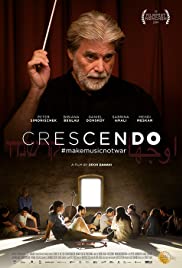
CRESCENDO
2020, 109 minutes, Colour.
Peter Simonischek, Sabrina Amali, Mehdi Meskar, Daniel Donskoy, Eyan Pinkovich, Bibiano Beglau.
Directed by Dror Zahavi.
A film that can be recommended to audiences interested in Israel and the Palestinians, the conflicts before the establishing of the state of Israel, the consequent occupation of Palestine by Israel, uprisings and wars, proposals of the two state country, and, at times, the seeming futility of these hopes and ambitions.
All this is dramatised in an interesting narrative, which involves the interest of the audience, consideration of the characters and their issues, their entanglements, but also eliciting quite an emotional response from the audiences towards the characters and their situations.
An entrepreneur from an international charity has the idea to raise money through a concert, the performers being young musicians from both Palestine and Israel. She approaches a renowned German conductor, Eduard (Peter Simonischek, who made such an impression as Toni Erdmann). He is wary, his parents being active Nazis, doctors in a concentration camp, responsible for many Jewish deaths. However, he is persuaded to audition the musicians.
The screenplay is very sympathetic towards the Palestinians, highlighting two families, the family of her taxi driver who is skilled with clarinet and trained his son, Omar, as a musician and plays at Jewish weddings. Layla, on the other hand, is a talented musician, studying, supported by her father, but her mother, fierce in her denunciation of Israel and its violence, is supposed to her participation in the concert. There is a telling scene where Layla is held up by a young Israeli soldier, a dominating young woman, while Omar’s father is forbidden to cross into Israel to go to the audition in Tel Aviv.
One of the benefits of the screenplay, giving some moments for quiet and reflection, is the inclusion of classical pieces, from Bach, Dvorak’s New World Symphony, Vivaldi’s Winter.
Eduard conducts the auditions, sight unseen, accepting some pianists, asking Omar and a young Israeli girl that he meets, Shira, who plays the French horn, to work together. One Israeli girl, rejected, exhibits a huge tantrum, indicating the easily aroused temper of Israelis who are thwarted.
Eduard appoints Layla as first violinist and in charge of rehearsals, arousing another tantrum in Ron, a skilled violinist. In many ways, this is a sign of what is going to happen throughout the rehearsals, some concessions, especially on the part of Daniel, but other musicians ever ready to erupt and attack. Eduard spends a lot of time, as does the film, showing various exercises in which the two sides are asked to vent their animosities, then try to look each other in the eye, getting them to collaborate, to be together on the camp for rehearsals, especially when they move to the beautiful scenery of the Austrian Tyrol, Eduard’s home.
There is a subplot with Omar and Shira, falling in love, deciding to run away, falling foul of a hostile local group who have already attacked the ensemble during a bike ride in the mountains. There are again severe consequences, further rousing of hostilities, culminating in the two groups at the Bolzano airport, a glass partition between them, each glaring at the other.
However, there is a moving combination, not a solution, but… Daniel takes the initiative to play his violin, Layla responding, the others gradually joining in as they play Ravel’s Bolero, the various musicians playing as the successive movements of Bolero continue, moving towards what the title of the film says in musical terms but in hopes of some kind of reconciliation, Crescendo.
1. The title? In terms of music? In terms of the conflict? And the finale with Ravel’s Bolero?
2. The settings? The Palestinian town, the streets, homes? The border with Israel and the long lines? Tel Aviv, the concert hall? The contrast with the South to roll, the beauty of the countryside, the mountains, the accommodation, the rehearsal rooms?
3. The musical score, the background music, the classics including Dvorak, Vivaldi, Bach…?
4. The idea, a response to the Israeli- Palestinian situation? Possibilities for peace, understanding, reconciliation? The corporate interest, raising money for support? The artistic interest? A concert, music to reconcile?
5. Karla and her approach, personality, businesslike? In touch with Israeli security? The approach to Eduard? Her proposal? His hesitation, his age, past conducting career, teaching, his wariness about his parents – and the later revelation that they were both doctors in Birkenau, responsible for Jewish deaths, their attempt to escape to Argentina, their being shot down? His being saved? And throughout his life, many regrets? Shame but the motivation to move forward?
6. The proposal for the concert, in Tel Aviv, rehearsals? The choosing of 100 musicians? Young? The buildup to the auditions, the range of musicians arriving? The blind rehearsals, Eduard’s response, invitation, rejection? The tantrum of the Israeli girl refused?
7. The teaser at the opening, the phone screen and Omar and Shira talking, their parents, love, the plan to run away? On the road, held up by the truck, the dark, the running, Omar’s death? The consequences?
8. Layla and her violin talent, continued practice, the noise in the streets, the teargas, closing windows? The support of her father? The demands and anger of her mother? Going to the checkpoint, the young Israeli woman and her demands, taking Layla aside? The story of Omar, the clarinet, the training by his father, their playing at weddings, his age, uncertainty, held up at the checkpoint, the not allow his father through? Recommendation to prayer? Meeting Layla, their arriving together, just in time? Their performances? Layla successful, Omar given the piece to practice with Shira?
9. Waiting, tensions between the two groups, Omar and his talking to Shira, her response, the French horn, their playing together, the bonding?
10. Eduard, in Israel,, his heritage, his manner with the auditions, with the students? The discussion with Layla and Ron? Appointing Layla, Ron and his tantrum, his return, the reaction of the students, the many civil war in the auditorium? Eduard and his response?
11. The family backgrounds in Palestine, the discussions about rehearsals, Layla’s angry mother, the hurts of the past? Omar and his father? The issue of going to Europe for three weeks?
12. Eduard and his handing the fighting, the rehearsals and his criticism of Layla and her technique, Ron, their not listening to each other?
13. The range of exercises that Eduard conducted, two lines, not touching, hurling abuse at one another? Sitting back to back? The telling of stories, the Palestinians and persecution, Israel’s taking over the homes? The Israelis and the accusations of murder and terrorism? Getting them to move amongst each other giving some kind of acknowledgement? The overall effect? They’re playing together, Dvorak and success?
14. Security difficulties? Transferring the concert to the Southern Tyrol? The group settling in? How many? Some friendships, collaborations? Omar, shy, the friendship with Shira, the swim, the sexual encounter?
15. Shira, her girlfriend, the photos and videos, her angry family, sending her uncle to bring her home? The proposal that the concert be on television? Hopes?
16. The exclusion to the country, the car in pursuit, the sabotage, people falling from their pipe bikes, the paint bomb on Eduard? The security issues following? The connection of this incident with the death of Omar?
17. Reaction to the death of Omar, Layla and her anger, the fighting amongst the group, the resumption of the Civil War? The cancellation of the concert?
18. The two groups at the airport, the glass barrier between them, the screen with the image of Omar, Ron taking initiative, challenging Layla, playing Ravel, everybody joining in – a musical collaboration, overcoming ideological difficulties, the crescendo? The fade to black and leaving the issues and the musical experience with the audience?
Pixie
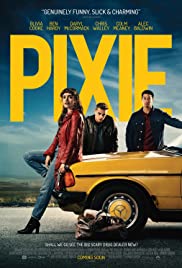
PIXIE
UK, 2020, 93 minutes, Colour.
Olivia Cooke, Ben Hardy, Daryl Mc Cormack, Colm Meaney, Alec Baldwin, Dylan Moran, Olivia Byrne, Chris Walley, Ned Dennehy, Pat Shortt, Sebastian De Sousa.
Directed by Barnaby Thompson.
For a girl’s name, Pixie sounds rather elf-like, fairy-like. In fact, Pixie here is something of a bewitching witch played with self-confident charm by Olivia Cooke. But this is something of a fairytale – more in the vein of the Brothers Grimm than Hans Christian Andersen!
There is an instant caption: Once Upon a Time in the West, in red. Then, in bold white, is added: Of Ireland. So we know we are in the land of leprechauns and of the IRA.
This is one of those enjoyable adventures where it is probably best to leave some moral sensibilities at the door. It is not meant to be taken literally – or is it? The Irish can spin a yarn and this is what this film is, a complicated yarn with so many twists and turns, so many characters with dubious and double values, and betrayals galore.
And, of course, Ireland has been a Catholic country with Catholic traditions and pedestals for the clergy. These come tumbling down pretty fast, also an indicator of what is to come. Two young robbers gatecrash a clerical meeting, local Irish, visiting clergy from Afghanistan – but, all is definitely not what it looks like, machine guns drawn, and down go the clergy who, in fact, were negotiating a huge drug deal, 15 kilos.
There is a romantic complication between the two men, one Pixie’s former boyfriend, on a long break, as he says, and her new boyfriend. Shooting, taking the bag of drugs, stalking Pixie.
Meanwhile, down at the bar, we are introduced to Frank and Harland (Ben Hardy and Daryl McCormack), old friends, eye on the girls, the drugs, Pixie giving them the come on. Pixie is a photographer and Frank ends up as a model, Harland seeing the threat from the old boyfriend, crashing into him – finishing up with a seeming corpse in the boot, the three on the run.
Meanwhile, there is a complication of Pixie’s father, discovering the dead man in the car, his being a gangster, past IRA gunrunner with Father Hector McGrath? (Alec Baldwin of all people), devoted to his daughters, tolerating his hefty son from a former marriage, but delighting in being a chef. There is also the sadness of the death of his wife, and Pixie visiting her grave.
Which all leads to more shenanigans, dad in pursuit, his hiring of a vicious hitman from IRA days, Seamus (Ned Dennehy), Frank and Harland relying on their friend who works at the airport, Daniel (Chris Walley) who suggests taking the drugs to his main dealer, his uncle (Dylan Moran). Uncle tries to be too smart but doesn’t count on Pixie and a swift knife with a thrust to his hand!
Pixie and co-on the run, eventually caught, finding out the truth about Pixie’s mother’s death. Audiences who were surprised, may be dismayed, by the sacerdotal revelation of drug dealing, there is an even more hyped-up climax, more priests, Father Hector McGrath? in vengeance mood, but always acknowledging God, an arsenal of machine guns, old-style habited nuns (of the severest Irish visages), a huge church shootout, but Pixie and her friends saved by the intervention… More twists than the coastal highways.
All’s well that ends well, so it seems, and for Pixie it is, but as for Frank and Harland…
1. The title? The title? Ireland and fairies, pixies, leprechauns? A malevolent Pixie in this caper?
2. Once upon a Time in the West… Of Ireland? The landscapes, beauty, rugged? The musical score and Irish tones?
3. In the vein of Quentin Tarantino and the Mc Donough brothers? Action, violence, humour, tongue in cheek?
4. The complexities of the plot? Of relationships? Of the past, gunrunning, the IRA, the Catholic Church? Memories, vengeance?
5. Pixie, in herself and ambitions, to go to San Francisco? The relationship with her stepfather? Memories of her mother? Siblings? The antagonism towards her stepbrother? Scenes at home? The later revelation of his vengeance? Her masterminding the crimes and the revenge? His double dealings – and violent comeuppance?
6. The initial robbery? The vengeance and violence? The two friends? Betrayal? Shooting? Colin and Fergus, his vengeance? His relationship with Pixie, Fergus betraying him? Going to the house, bent on revenge? Harland and Frank, friendship, the past, studies, in the bar, led on by Pixie, going to the house, ex going inside, the irony of posing for the photo, Colin arriving, Harland hitting him, hiding him in the boot? On the road with Pixie? To manipulating all the men?
7. The friends looking for the money, the drugs, going to the Presbytery, the meeting of the priests, the visitors from Afghanistan, the revelation, drug dealing and violence, the shootout? The drugs?
8. The significance of Hector Mc Grath, Alec Baldwin in the role, the past and the gunrunning, links with O’ Brien?
9. Dermot O’ Brien, the past, gunrunning, minor gangster, tracking down the young men, the shootings? The drugs? The money? Scenes at home, benevolent stepfather? His going on the search?
10. Frank and Harland, their friend the drug dealer, at the airport? Their plans for distribution, making money? The friend and his reference to his contact? The visit to him, the seeming deal, his smart talk, looking down on Frank and Harland, turning the tables, the violence, his death?
11. The hired killer, tracking them down, old man, his past, cornering them, in the fields, the irony of his death?
12. Pixie and the two men, leading them on, the threesome, their attraction to each other?
13. On the run, across the countryside, crises, near misses?
14. Going to the church, the buildup to the finale, Hector Mc Grath, rogue priest, yet his invocation of religious words prayers? The savage nuns? The other clergy? Pixie and her
friends? The nephew of Father Mc Grath, the past with Pixie, being kept out of the fight? The arrival of the gangs, Dermot? The violence and savagery, yet tongue in cheek, of the
final shootout?
15. The finale, Frank and Harland, pleased at getting the money? Pixie going to San Francisco? And her deceiving them, leaving them a loss?
16. An Irish Tarantinoesque escapade?
Long Story Short
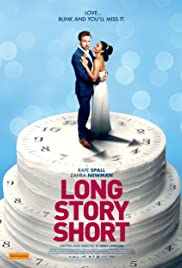
LONG STORY SHORT
Australia, 2021, 90 minutes, Colour.
Rafe Spall, Zahra Newman, Noni Hazlehurst, Ronnie Chieng, Dana Kaplan, Josh Lawson.
Directed by Josh Lawson.
Long Story Short sounds a touch enigmatic. However, it is actually a witty summary of how this entertaining moral fable works. It is a fantasy, a what if…? kind of story.
And, it explicitly notes its debt to Groundhog Day. In fact, this is something of a Groundhog Decade. Our hero, Teddy, wakes up each morning not to find that he is reliving the same day but rather a whole year has gone by – with a complication that he does not remember anything of the year that has passed but everybody else does and takes it for granted.
A moral fable. What if one had the opportunity to look into the future, to see what happens or, as a strong caution, to see what might have happened. How would we change our lives?
There was a film of the 1950s with Debbie Reynolds, It Started with a Kiss. And that is what happens here – vistas of Sydney Harbour, the bridge, the Opera house, the atmosphere of New Year’s Eve, and Teddy rushing to see his girlfriend, kissing her at the midnight moment – only to find that it is someone else wearing a similar dress and colour! The screenplay doesn’t waste much time and soon the couple are in love, engaged. Zahra Newman plays Leanne, a genial and sympathetic woman with whom anyone could fall in love.
Teddy goes to talk to his father in his grave at Waverley Cemetery and there he meets a strange older woman, played with dignity by Noni Hazlehurst, who challenges him about his forever delaying matters, always talking about ‘later’, being preoccupied with work and putting things on the long finger. Then, before you can say long story short, Leanne and Teddy get married. Needless to say, even on the wedding night, Teddy becomes preoccupied with his work.
Then, when he wakes up the next morning, his Groundhog Decade has begun. The audience is tantalised, along with Teddy, about what has happened in the previous year, of which he knows nothing! He does get filled in by Leanne and his close friend Sam (Ronnie Chieng). What could happen over a decade in a marriage? Yes, fondness and love, busyness and work, pregnancy, the birth of a child (and Teddy having to learn whether it was a boy or a girl and dislikes the name, Tallulah), distance, Leanne upset, leaving, possibilities of other relationships, even divorce. With Teddy all the while bewildered because it is still for him, the morning after the wedding night and he still loves Leanne.
There is a mysterious tin with a rattle, a gift from the strange woman at the cemetery, to be opened only after 10 years.
The question is, will 10 years, even in long story short form, be enough for Teddy to realise what he believes in, his love for Leanne, his love for Tallulah?
The film was written and directed by Josh Lawson, national and international actor, who wrote the comedy, The Little Death, and appears here in a significant cameo role as a psychologist with Leanne – and whom Teddy definitely dislikes.
The light touch but serious implications in this moral fable.
1. The title? The story, over 10 years, abbreviated?
2. The variation on Groundhog Day, a groundhog decade?
3. The Sydney settings, the harbour, the beaches in the eastern suburbs, the views? The range of Sydney locations and atmosphere? The musical score?
4. Teddy’s story, his age, meeting his girlfriend, New Year’s Eve, kissing Leanne, the mistake? The quick move, the consequences? Friendship, in love, engagement? Teddy and his always delaying matters,… Later? Always something else to do?
5. Teddy in the cemetery, talking to his father? The stranger, Noni Hazlehurst’s presence, talking with him, challenging him and his delays? Urging him to think? Urging him to act more quickly?
6. The wedding, the celebrations, the gifts, the mysterious tin and its rattle? Not to be opened for 10 years? The range of friends? The support of Teddy?
7. The wedding night, Leanne, her charm, love for Teddy? Teddy and the phone calls, preoccupation with his work and contacts?
8. The next morning, the beginning of the groundhog experiences? A year passing overnight for 10 years? Teddy and his not knowing what had happened during the preceding year? The other characters knowing and taking it for granted, talking about what happened? Teddy and his growing bewilderment, beginning to adjust to the changes each year, intervening in his own life?
9. The range of experiences over the 10 years for Teddy and Leanne, Teddy always being busy, Leanne devoted but feeling more neglected, the discussions with Sam? Leanne pregnant one year, the child the next, Teddy not knowing its name, his reaction to Tallulah? Her growing up? Sam, the melanomas, his illness, death? Teddy and the distance from Leanne, his not believing what was happening, the gradual alienation, Leanne leaving, Teddy and his liaison with, Leanne’s reaction? Divorce papers, Leanne and her relationship with Patrick, the psychologist, Teddy’s negative interactions with him? His growing a beard? Signing the papers? The day with Tallulah?
10. Teddy and Becka moving in? Leanne visiting and talking with Becka?
11. The encounter with the strange woman, telling her own story, the lesbian story?
12. Teddy, the 10th encounter, searching for the 10, the reconciliation, love?
13. The light touch, the serious implications of living one’s life to the full, not delaying, being busy, neglect? And the fable of showing what one’s life could be, might have been?
Skies of Lebanon/ Sous le ciel d' Alice
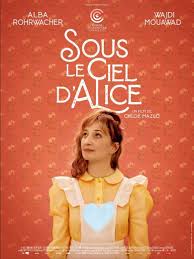
SKIES OF LEBANON. SOUS LE CIEL D'ALICE
The 2020, 892 minutes, Colour.
Alba Rohrwacher, Wahdi Mouawad, Isabelle Zighondi,
Directed by Chloe Mazlo.
Over the years there have been many films about the civil war in Lebanon, some from Lebanon itself, others from Israel and the Israeli perspective on the war, Hezbollah and its antagonism towards Israel, Israel and attacks.
This is a personalised perspective on Lebanon, decades of peace, antagonism, civil war and brutality, the collapse of the country. The English title emphasises the focus on Lebanon itself. On the other hand, the French title focuses on the central character, Alice and her experience in Lebanon and of the war.
The film opens with Alice sitting on a boat, leaving Beirut in 1977, writing a letter to her husband who has remained behind. Then she destroys the letter. Later during the film, we see her writing another letter, reflecting on her reasons for returning to Switzerland, and her disappointment.
The action of the film then moves into animation, clay animation, eccentric figures, life in Switzerland in the mountains, the young Alice and her training in infant care, the nuns supervising, her getting her diploma, scenes with her family at the meal table, an invitation to work in Lebanon, her farewell to the family and sailing for Lebanon. There is some animation later in the film, especially in maps for travels.
However, the style then moves into live-action, but often very stylised, like animation. Alice is dressed like Alice in Wonderland, with a pinafore. One of the key focuses on Alice and change is what she wears throughout the film. She is met at the wharf by what seems like a fairy godmother character (who will later become involved in the violence of the Civil War). Very quickly, sketches of Alice wheeling a pram, studio sets with photos and paintings in the background.
However, the action becomes more real as Alice encounters a friendly man, Joseph (played by Wajdi Mouawad, play on which the excellent Lebanese film, Incendies, was based) at a cafe who recites a poem and then quick action, Alice meeting his family, love, marriage, their life together, a touch of animation as storks with bundles fly over with Alice reaching for one, and eventually capturing one, baby daughter, Mona.
All is well with Alice, bonding well with Joseph's brother and his family, and his sister. And Joseph, who has revealed that he is interested in rocket science and works in a laboratory, continues with his work, some achievement, Alice going to the launch of some rockets.
It all seems rather idyllic.
1975, rumblings of war, bombardments, assassinations, fighting in the streets (symbolised here by one street and a pile of sand bags, a group of enemies on each side, clashing). The hostilities gradually impose on Alice and Joseph, their daughter wanting to go to Paris to follow her boyfriend who has left, bombings on the rocket laboratory, troops invading the house in search for weapons, peacekeeping forces intruding. While not much war action is actually shown on screen, the tensions, the atmosphere, the dangers are ever present.
And back to Alice on the boat, Joseph staying to keep working on the rockets, regrets - but the audience leaving the film with great feeling and some hope.
1. The emphasis of the English title, on Lebanon itself and the Civil War? The original French title and the focus on Alice and her story?
2. The openings in Switzerland, the mountains? Homes? The transition to Lebanon, airport, city, streets, homes, rocket development, the Muslim community? The transition to the war? The musical score?
3. The opening, Alice on the boat, writing the letter, speaking to Joseph, destroying the letter, the later recurring of this sequence, the new letter?
4. Alice and her family, the use of animation, the characters and their appearance, clothes, Alice and school, care for babies, the nuns, the diploma? Her family, the meals? The offer of a job, Lebanon? The family farewelling her?
5. The live-action, Alice on the train, yet the stylised presentation, studio sets, artificial backgrounds, the same with Alice walking through the city? Her dress, little girl, Alice in Wonderland, pinafore? The help from the fairy godmother character, driving her to the house? The live-action animation style for her story, into the house, wheeling the baby, at the cafe?
6. Joseph at the cafe, watching Alice, gradually speaking? His reciting the poem? And the rapid development of the relationship, the marriage? The passing of the years, Swift live-action, touches of animation, especially reaching for the storks and finding the baby? The relationship with the extended family, Alice welcomed, Georges and his wife, the children, Joseph’s sister, Mona as a little girl, growing up? Meeting with Selim at the gallery, Mona and her relationship?
7. 20 years in Alice's life, from young girl to mother, to midlife? The change of appearance, clothes? Joseph, his getting older? The bond between the two?
8. Joseph, his work with rockets, the laboratories, co-workers, launches? The Civil War, the bombardments, the threat to his work, the bigger rockets?
9. Factions in Lebanon, comfortable life, the outbreak of hostilities, the symbolic presentation of the barrier and sandbanks and road, the hostilities on each side, soldiers, and masks, George's son joining them? His rifle? The television reporting hostilities? The hearing of the bombs and bombardment? The many ceasefires and their being broken? Political manoeuvres, government collaborations, musical chairs and exclusions?
10. The effect of the family, everybody coming to live with Joseph and Alice? Their welcoming? George and his being trapped, the phone call? Selim, going to Paris? His mother and family and the decision to go to Paris? Mona and her being upset? The plan to go, the discussions, Alice reluctant, her father letting her go? The life and work in France? The many migrants?
11. The soldiers, searching the house for weapons, creating mess? The peacekeeping forces, masked, into the house, the meal, Alice's harsh reaction?
12. Tension between Alice and Joseph, his work, the bombardment, making the choice to stay with his work? Urging Alice to go back to Switzerland? The poem and his note?
Alice, the ticket, getting the Visa for Joseph?
13. On the boat, the letter, her reflections and Joseph appearing?
Menachem Begin: Peace and War
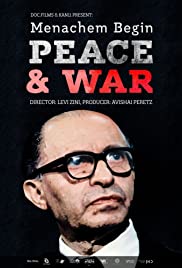
MENACHEM BEGIN: PEACE & WAR
Israel, 2020, 87 minutes, Colour.
Directed by Levi Zini.
This is a documentary film, an edited version of a television series, 3 x 50 minutes episodes, on the sixth Israeli Prime Minister, Menachem Begin. It presupposes some knowledge of Begin but, for those not familiar with him or this part of Israeli history, there are some explanations and background.
While the film opens with Begin’s campaign for re-election in 1981, criticisms by the Labor leader, Shimon Peres, and the bombing of Saddam Hussein’s nuclear reactor (with footage), the film moves backwards and forwards in time.
Begin had been in power in Israel for almost 3 decades, in opposition, with the Herut, Freedom party, a right-wing group – which antagonised Israel’s Prime Minister, David Ben Gurion. However, by 1977, Begin became Prime Minister of Israel.
The documentary does fill in some background of Begin’s and life, his origins in Brest (in today’s Belarus), his studies at the University of Warsaw, escape in the early years of the war to Vilnius, military service, transfer to Palestine. There is some background to his anti-British stances in Palestine, the tactics of “freedom fighters� rather than “terrorists� and the bombing of the King David Hotel in Jerusalem.
The documentary gives a great deal of attention to Begin’s association with former general from the Six Day War, Moshe Dayan, his defence Minister, and the meetings sponsored by Jimmy Carter at Camp David, negotiations (sometimes through the Romanian dictator, Ceasceau) and the meetings with Egyptian leader, Anwar Sadat. There is a great deal of footage, and also the visit of Sadat to Israel. While there is agreement, Begin did not implement some of the agreement as hoped for.
And, the enemy emerges in the form of Yasser Arafat.
The film does not focus on the end of Begin’s career, his depression with the death of his wife, his retiring from public life, his final years of seclusion until his death.
Boite Noire/ Black Box
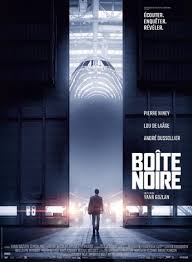
BOITE NOIRE/ BLACK BOX
France, 2020, 129 minutes, Colour.
Pierre Niney, Lou de Laage, Andre Dussollier, Sebastien Pouderou.
Directed by Yann Gozlan.
This is an intense detective story. However, detective story might be overstating the case, even misleading. But, it is an investigation.
A flight from Dubai to Paris over the Alps, opens the film, audiences familiar with flights identifying easily with what is going on, the range of passengers, meal service, movement around the plane, the taking of selfies¦ We see the flight attendants bringing meals to the pilot in the cockpit. Then, danger, upset, the mystery of a crash and debris scattered through the Alps.
Then we are introduced to the expert investigators. The focus is on Mathieu, a substantial role for popular French actor, Pierre Niney, an intense young man, revealed more and more as passionately obsessive, who has had theories about causes for crashes, speculating but evidence indicating he was wrong. Some of the authorities prefer him not to be on investigation cases and that is the case here. The sequences at the crash site, the finding of the black box, the opening, are televised and Mathieu watches. The recording from the black box is downloaded, taken to the laboratories and listened to over and over again, trying to detect sounds, irregularities, voices…
Mathieu wanted to be a pilot, has poor eyesight, but has an intensity of sensitivity to sound.
Mathieu is married to his wife, Lou de Laage, who is also an expert in aviation, working on checking security for aircraft. She is being lured to another job with the aviation company whose plane has crashed. She is friendly with the Chief Executive and with other flight authorities. Mathieu, on the other hand, perseveres with his work, the initial investigator having disappeared. He is supported by his boss, played by French veteran, Andre Dussollier.
The disappearance of the chief investigator moves the action into a detective story, with Mathieu searching the investigator's office, finding an address, going to the house, unearthing further information, leading to the solving of a mystery about the black box itself.
In the meantime, he continues with hypotheses, continually testing, trying the patience, even of his boss who has to ask him to step down. And, he clashes with his wife, even taking documents from her computer, with leads to severe estrangement.
In fact, the last 20 minutes of the film are quite action-packed, Mathieu and danger to his life, finding the information that solves the case, the film visually showing what happened on board, and the dramatic and public expose of the person responsible, ultimately, for the crash and a cover-up.
g
1. The title? Planes, crashes, the significance of the black box?
2. Paris, offices, airports, warehouses, homes, country estates? Atmosphere? The musical score?
3. The plane, interiors, ordinary service, passengers, staff, pilots, difficulties, the mystery, the crash? The repetition of the interiors of the flight, the selfies, suspicious passages, the cockpit and the pilots' reactions, the meals, the announcements? The building up of the picture of what happened during the flight? The crash and the debris strewn in the mountains?
4. The film as a detective story, the investigation of the crash, the investigation of the technology, the personnel? The emergence of the crime?
5. Mathieu and his story, age and experience, wanting to be a pilot, his sight and hearing difficulties? Heightened auditory perceptions? Intense, introspective, the focus on detail, rational understandings, elaborating theories? The background of his treatment of the case of the crash plane, his insistence on what he heard, the evidence against him? Admiration for him by Renier, working with Pollock, his insistence with Pollock, arguing with Pollock, Pollock choosing another associate for the investigation?
6. Mathieu and his relationship with his wife, her work, aviation, approval of aircraft, her being recruited for the company? Her social life, contacts, material and his reluctance to socialise?
7. Pollock, the television coverage of the investigation, uncovering the black box, listening to the voice and sounds? His assistant, Pollock's disappearance, the request for Mathieu to step in?
8. The details sequences Mathieu listening, the visuals of the soundwaves, the technology? His attentive listening? With a heightened attention, affirmation, discussing theories, writing the report? Mathieu and his heightened sense of hearing, his speculations?
9. Mathieu and his range of theories, of interference with mechanisms? The tests and the evidence against him? Tensions with his wife? Suspicious about her contacts? Her lying about the meal? His invading her computer, getting the file?
10. The contact with his friend Xavier, Xavier and the offer of the job to Mathieu’s wife, his being seen in Pollock’s video? Mathieu accosting him? The meal with Mathieu's wife and his knowing more than he should have?
11. The possibility of a terrorist incident, the audience seeing the suspicious man going to the toilet? The press conferences, the journalists and their questions?
12. Mathieu and the increasing intensity? Obsessive, being removed from the investigation? His investigating Pollock's office, getting the address, going to his home, the search of the house? His returning there, with the GPS, the search in the lake, finding the black box? The intruders in the house? His driving? His paranoia? The crash?
13. In the house, the time to download the black box information? His listening, the audience hearing what happened? The journalist and the contact with the hacker in the past, the theory that he was on board the plane, that he had the technology to interrupt transmissions? The visualising of his being on board, his computer, his actions, his inability to control his computer, the crash?
14. The opening of the exhibition, Xavier and his speech, Mathieu's wife and her playing the confession by Pollock? The arrest? Mathieu, the close-up of him in the crash, on his ear, his death?